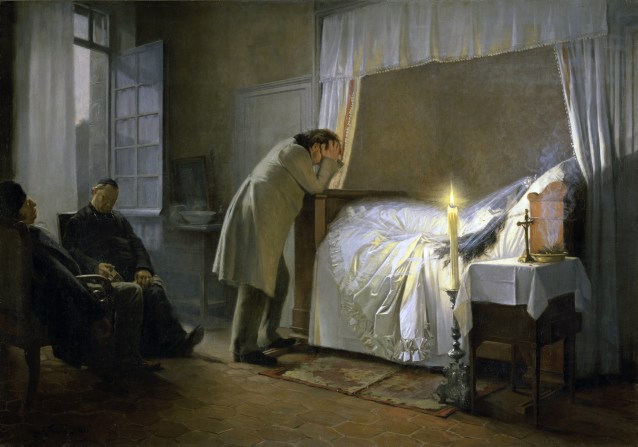
Growing reluctance to engage with books is endangering democracy and science. Deep reading boosts the human capacity for abstract and analytical thinking, protecting us from the corrosive effects of bias, prejudice and conspiracy theories.
Read me: words can change the relationship between lived reality and idealistic dreams, as writers from Gorgias and Plato to Cervantes and Flaubert – whether they embraced or feared literary seduction – testify.
‘A word, and everything is saved. A word, and all is lost.’
André Breton1
Few authors have been as fixated on the power of the word as Gustave Flaubert. His literary programme included an exhortation to always seek out le mot juste – the most correct, most appropriate word for the context. ‘The selection of an adjective’, he explained, ‘can make me sweat blood.’ Many of Flaubert’s novels explore the way in which a simple exchange can shape a person’s destiny.
‘They do it in Paris!’ Madame Bovary’s lover exclaims at one point. And Flaubert is quick to comment on the statement’s life-altering consequences: ‘that remark, like an irresistible argument, decided her.’ Later, Emma Bovary is struck by the fact that she has a lover, and this singular word – ‘A lover!’—is powerful enough to remind her of ‘the heroines of the books she had read.’ In fact, the mere recollection of these sisters makes the ‘lyrical throng of adulterous women’ break into song for her.2 Emma Bovary’s life is shaped in accordance with the ‘too-lofty dreams’ that poetry has been spinning in her – and not just in her. Flaubert has remarked that Madame Bovary is all of us, as we fall prey to the seductive words that swivel around us, the stories that call us to worlds beyond those where we actually reside. Words – the words Emma Bovary reads, writes and, in the course of living her own life, seeks to embody – offer a line of flight for desires suffocated by the strictures of nineteenth century French bourgeois culture.3

Don Quixote and Sancho with wind turbines. Sotavento, Xermade, Galicia (Spain). Photo by Luis Miguel Bugallo Sánchez (Lmbuga) from Wikimedia Commons.
The works of Cervantes and Flaubert represent landmarks in a rich literary tradition that explores the relationship between lived reality and idealistic dreams, focusing on the friction at the meeting point between the harsh facts of reality and the dreams we indulge to escape from those facts. Life is at once here and now – with all its boredom and emptiness – and marked by the birth pains caused by the dreams of an elsewhere which is inscribed into people’s imaginary by words. The question is how deep into the land of dreams a person can venture before she loses touch with reality. What, exactly, are the enigmatic mechanisms at work at the heart of the word? By which means do words, written and spoken, enchant a person to such a degree that she comes to think of herself as destined for a life different from the one she is living, and herself as being someone she is not? From whence comes the power that convinces a person to battle windmills, thinking them evil giants?
‘There are some people,’ La Rochefoucauld writes, ‘who would never have fallen in love if they had not heard there was such a thing.’ This might be taking it too far. But following Cervantes, we can say at least that there are people who would never have imagined themselves knights if they had not read novels about knights.
The dream of a different life as portrayed through the heroes and heroines of literature appears now as cure, now as poison, now as a necessary leap from the dread of living, now as damning illusion. It appears as much too much, or much too little of the good (or, for that matter, the bad). Distinguishing cure from poison is not always easy. It is, as we shall see, no coincidence that the Greek term pharmakon recurs in literary forms – whether classified as philosophy, theology, poetry, or other – that seek to define how the interpellating word sticks to the soul and molds itself as an imaginary node of fate.
Pharmakon: a word that signifies both medication and drug, treatment and poison, all depending on dosage and context. In the case of Emma Bovary, the word’s aspirational promises ultimately flip, brutally, into poverty and death by arsenic.
A word, and everything is saved. A word, and all is lost.

The Death of Madame Bovary. Illustration by Albert Fourié, 1883. Musee des Beaux Arts, Rouen ©SuperStock/Leemage. via Wikimedia Commons.
There is an interesting ancient counterpart to the tragic hero or heroine, another fictional character who, some say, let herself be bewitched by powerful words and in so doing brought on the downfall of entire societies: the beautiful Helen.
Indeed, this is how she’s portrayed in a fragment from the well-known Greek sophist Gorgias (also known as the namesake of one of Plato’s dialogues): as victim to the seductive powers of logos. Gorgia’s short encomium for Helen presents a convincing defense of the poor girl, who is a frequent object of ridicule and derision at the hands of other Greek writers. In opposition to the popular claim that Helen was the cause of the bloody Trojan war, Gorgias argues that she was nothing but a pawn in the hands of higher powers. The list of such powers is long: Gorgias lists, to begin with, such greats as destiny, gods, necessity.
Additionally, he says, it is essential to study the extent to which Helen was subjected to other forces like violence, love and fear. These powers must, of course, in one way or another have communicated their intentions to her, which is to say that they must have addressed and interpellated her through the word. Gorgias posits that if Helen was brought down her fated path by the power of speech and words (tou logou dynamis), she can hardly be faulted for letting herself be persuaded and misled. As a rhetorician, Gorgias knows better than most that words have the power to both instill and alleviate fear, to inspire both tears and laughter, promote both love and hatred – words are both poison and cure. Indeed, employing a term with which we are already familiar, he compares the persuasive quality of the word to the effects of a strong intoxicant, explaining that the word is a pharmakon (φάρμακον): ‘For discourse was the persuader of the soul, which it persuaded and compelled to believe the things that were said and to agree to the things that were done.’4
When Plato takes on Gorgias and the sophists, his primary complaints are not about the bewitching power of the word. Instead, Plato debates in what situations a person has the right to employ the word. Contrary to Gorgias’s focus on an art of persuasion that might ‘enslave’ people, Plato puts forth a philosophy of the word as intended to ‘enlighten’ the listener or reader about the right, the true, the beautiful. The trouble with the sophists, he says, is that they limit themselves to teaching (for remuneration!) the art of persuasion, without any concern for the content of their persuasion. True or false, bad or good, righteous or dishonest – it holds no weight for the sophists. Instead, their primary objective is simply to change the listener’s mind to whatever the speaker is currently espousing or finds useful. Philosophy, in contrast, subjects itself to the higher goal of creating knowledge about that which is, once and for all, true, good and beautiful. This requires a careful study of the words that circulate in the populace, a study intended to separate the right word from the wrong. Le mot juste: the right word is also the righteous word.5
Plato’s fear of seductive words’ destructive potential is evident in The Republic, a text that is an early instance of the melding of philosophy and politics, of power and knowledge, with particular attention to wrongful and dangerous words. Plato is focused on the word’s ability to spread through the body politic and enter the souls like a virus, a poison. The word spreads by taking hold of people’s emotions and attachments, thus conquering souls. The Republic makes the observation that Cervantes and Flaubert would later illustrate so eloquently: poetry can make whomever believe that she is whatever and that she has the right to whichever freedoms she chooses. Seduced by the word, the slave might suddenly believe he is a master, the woman that she’s a man, the man that he’s a woman, the child that they are a grown person, the grown person that they are a child, and so on.
Plato’s analysis rests on a more comprehensive reflection on the most righteous way to combine the three constitutive elements of a political community: ‘production’ (the distribution of work); ‘reproduction’ (the regulation of sexual relations); and ‘defense’ (the organization of the military might of the polis). The Republic takes it as evident that these three elements can only work in concert when supported by reason inculcated by systematic fostering and education of the populace – through the communication of the right words.
For the righteous order to hold, there can be no ambiguity, no mixed signals that create confusion around what is what and who is who. Put more concretely: there can be no interpellation that might encourage man’s tendency to dream of other objects, other lives, of an existence beyond the given order. This is where Plato’s thinking around the elements of reproduction and the regulation of drives in general turns truly interesting, as we are told that the task is one of stifling any desire (Plato uses the term epithymia) that swells beyond measure, any desire not motivated by necessity as it tempts people to satisfy drives that are beyond the strict needs of nature and community (chreia). Therefore, state-mandated education entails the fixation of the correct measure and object of desire: an individual cannot want more than her specific lot in life, cannot want anything that is not hers. If this is not achieved, chaos – even war – threatens the lives of all.
Like Cervantes, Flaubert and Gorgias, Plato is studying the desires that put the individual in conflict with herself and the current order, dissecting the disorderly love (Eros) that makes a person wish she were someone other than the person she is and is expected to be, thereby making her a destabilizing element in the delicately balanced distribution of roles interests, and tasks that hold a society together. Plato warns that there is in every man ‘some terrible, savage and lawless form of desires’, desires that make themselves known the minute we let go of the reins, for example, during sleep. This is when
the beastly and wild part, gorged with food or drink … seeks to go and satisfy its dispositions. You know that in such a state it dares to do everything as though it were released from, and rid of all shame and prudence. And it doesn’t shrink from attempting intercourse, as it supposes, with a mother or with anyone else at all – human beings, gods, and beasts; or attempting any foul murder at all, and there is no food from which it abstains.6
This is the banished part of the soul – the part of man constituted of unregulated drives – which the state is tasked with controlling to protect society from the feverish effects that would result from its freedom. Plato argues that intense cultivation is required to keep this desire in check, a full apparatus of pedagogical tools. Good education and child rearing is not sufficient, however. Human speech and its communicative channels must be under constant surveillance since even a few loose words can have the power to awaken the transgressive drives. The task of political censorship is therefore about controlling who speaks of what.

Plato and Aristotle in Raphael’s 1509 fresco The School of Athens. Photo from Wikimedia Commons.
This is the motivation for Plato’s strict and systematic study of the representative arts. He spends significant time on the Homeric songs, which in his view possess the dangerous ability to nurture the dangerous drives as they speak to ‘the soul’s foolish part’ by emphasizing the erotic and aggressive desires that alienate people from the gods, each other and their true selves. Responding to the question of who or what is misleading the youth – the accusation leveled at Socrates – Plato instead posits sophists, storytellers and classical literature as culprits. The cure is found in the art of philosophy, which must be given jurisdiction of the word; philosophers must be made kings of the state with the right to control which stories circulate in the body politic. To make and protect a reasonable and righteous order, philosophy must protect the people from exposure to just any histories, shaped by just anyone.
Once again, word is pitted against word, philosophy against rhetoric, and the healing power of truth against the poisonous art of the word that risks implementing ‘a bad regime in the soul of each private man’.7 In his scrutiny of the Homeric songs, Plato reserves particular scorn for the passages that depict gods and heroes as weak in spirit and easily led astray by the flesh, for instance when Zeus is portrayed as misled by erotic pleasure. Even the strongest warriors allow themselves to be overpowered by female emotions in these songs, making them bad role models for the youth:
We’ll beg Homer and the other poets not to be harsh if we strike out these and all similar things. It’s not that they are not poetic and sweet for the many to hear, but the more poetic they are, the less should they be heard by boys and men who must be free and accustomed to fearing slavery more than death.8
Plato underscores that these portrayals are dangerous precisely because they penetrate so deep into people’s souls. In some places he sounds almost like Gorgias who, as we saw, claims that discourse persuades and compels the soul to ‘believe the things that were said and to agree to the things that were done.’ Elsewhere, the philosopher appears as an antecedent to those who would, much later, accuse Madame Bovary of corrupting morals and the holy principles that link woman and man, adult and child, creator and created, individual and society.
Plato proposes replacing dangerous tales of classical literature with ‘beautiful stories’ (logois te kalois) and instructive narratives that model a way of life and a righteous peace with every person’s natural duties. Gods and decent men should be upheld as lodestars in the noble art of taking the reins of themselves and getting their own houses in order. Le mot juste is the word of truth and self-control, which cures man of his desire to live other lives, in other worlds.
And yet, Plato is convinced that transgressive desires cannot be tamed by truth alone. Additional tools are necessary to keep the senseless power of Eros at bay. One of The Republic’s key passages declares that even philosophers are sometimes required to use ‘a throng of lies and deceptions’ in the form of imaginative myths and pedagogical plays in order to unite the population – at least when it comes to the city that ‘has its place in speeches’.9 And so, we find that even Plato’s promised cure – philosophy – must imitate the very poison – rhetoric – it was supposed to free us from.
Visualizza questo post su Instagram
A. Breton, Earthlight, 1923 (trans. B. Zavatsky and Z. Rogow, 1993).
G. Flaubert, Madame Bovary – Provincial Ways, 1856 (trans. L. Davis, Penguin Classics, 2010).
cf. Soledad Fox, Flaubert and Don Quixote. The Influence of Cervantes on Madame Bovary, Sussex Academic Press, 2008.
Gorgias, The Encomium of Helen (trans. B. R. Donovan, 1999).
Plato, Gorgias, 452 d-454 c. Plato’s argument should be understood in the context of the terrible verdict against his beloved teacher Socrates. This tale of justice – or, rather, injustice, as Socrates was falsely accused and sentenced to death – illustrated, for Plato, the serious threat rhetoric poses to truth.
Plato, The Republic (trans. A. Bloom), 571c.
ibid., 605 b-c.
ibid., 387 b. Plato explores poetry extensively in books 2, 3 and 10.
ibid., 442 a, 459 d, 592 b. Plato expressly writes that even lies and deceit can be useful when employed as a cure (pharmakon).
Published 26 August 2021
Original in Swedish
Translated by
Kira Josefsson
First published by Glänta (Swedish version); Eurozine (English version)
Contributed by Glänta © Michael Azar / Glänta / Eurozine
PDF/PRINTSubscribe to know what’s worth thinking about.

Growing reluctance to engage with books is endangering democracy and science. Deep reading boosts the human capacity for abstract and analytical thinking, protecting us from the corrosive effects of bias, prejudice and conspiracy theories.

In rekto:verso: what the body of the action hero says about relations of power; why yoga’s discourse of accessibility rings hollow; and whether fitness practitioners should really be reading Mishima.